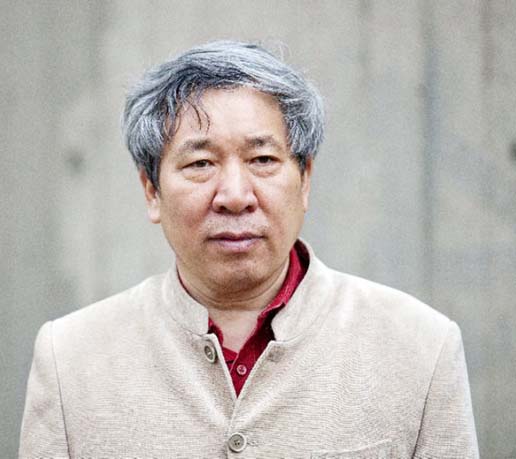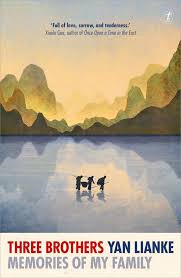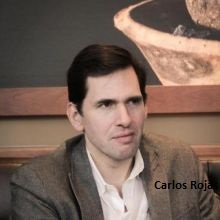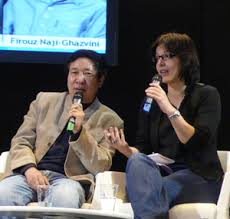
Yan Lianke is an important writer who would be a very presentable Nobel Prize. A writer who knows how to renew himself and to whom I have already devoted with pleasure ten articles. « Three Brothers », published last year (1), is translated by Carlos Rojas, a professor at Duke; his seventh translation.
This book, « My Father’s Generation, » has been a great success in China, where 300,000 copies have been sold since 2009. A shorter text, 60 pages, « Thinking of my father », was translated in 2010 by Brigitte Guilbaud and published with other texts by Editions Philippe Picquier (2).
Yan Lianke came to the Paris Book Fair in March 2010 and with the help of Brigitte Guilbaud, I was able to interview him about this book and about the current evolution of filial relations, which are much looser.
« Three Brothers » is about Yan Lianke’s father in the chapter « Missing my father », about fifty pages long. Other passages tell us about Yan Lianke’s youth but especially about the life and family of « First Uncle » and « Fourth Uncle ».
– I couldn’t survive without the land »:
Like Mo Yan and Gaomi, Yan Lianke is indissolubly linked to Tianhu village, Song district, Henan province (near Luoyang) where he was born in 1958. A poor family of illiterate peasants. An older sister who is ill, a brother, a younger sister who does better than him during her studies but who will have to leave school because the parents cannot finance the studies of both.
Women play only a marginal role in the book, even though it is clear that their ability to organize family life is essential. Yan Lianke, in the interview in Paris in 2010, underlines the greater weight of young girls who work outside their village and whose income becomes indispensable.
At the time, the land was essential, « my father was a peasant and work was his duty. Only by working day and night could he feel truly alive and believe that his life had significance » (p.48). The family plot, planted with sweet potatoes, had become fertile after several years of effort; this is why the Party’s decision, in 1966, to collectivize these plots was a heartbreaker.
Another decision that was not well accepted was the arrival of « educated youth » who were sent to the peasants to learn the revolutionary ideal. Many writings mention that these young people were badly treated in the villages (3); Yan Lianke underlines that six or seven young people from Zhengzhou were housed and fed in the village without being forced to work. They make fun of the peasants and are protected by the authorities in case of incidents even when they are responsible for them.
– Missing my father:
His father, like his brothers, believe that their primary responsibility is to build a roof for their children, which will enable them to find a spouse and to start a family. Without money and materials, building a « hard » house with a tile roof is an exhausting work that worsens the father’s health; stones are transported, used, and sold to buy tiles.
The principles are rigid, no debts; a family with its head held high. Yan Lianke fondly remembers the punishments and beatings he suffered for stealing from a neighbour’s garden. He failed to enter university. Leaving his village became an obsession. After several years of hard work in a cement factory where Fourth Uncle was employed, he managed to be recruited into the army.
This distressed his family and his village during the Sino-Vietnamese war of 1979, but it allowed him to continue his studies and to begin writing. Later he will think « that it wasn’t so much that I was escaping from the land but rather that I was betraying my family…I was giving up the responsibilities and obligations that a son should have for his father and his family »(p.75).
His father died young, at the age of 58; this book is an act of repentance and he regrets what he considers to be his selfishness at the time, especially since he had promised himself several times to write in memory of his father. He did not honour this promise until much later at the request of one of his sisters and after the death of the three brothers. « People are often like this, understanding things only after it is too late and becoming generous and selfless only when those qualities are no longer needed » (p.91).
– His father’s generation:
He pays tribute to his uncles, his father’s generation; « the protective wall around the family has collapsed » (p.205). A lot of admiration for the eldest who could have had a much easier life if only he had known how to read. He does not hide their weaknesses: one is sick with gambling, the other abuses alcohol.
A somewhat brutal honesty, reinforced by a deliberately neutral style without many images and descriptions, with very beautiful poetic passages but which seem to be plastered on the rest of the text.
The eldest had six sons and two daughters; he was able to protect his family during the famine years of the « Great Leap Forward » or, as it should be said, « the three years of natural disasters ». His son Tiecheng, a soldier, died in Urumqi, probably a suicide that the army is trying to cover up. His last daughter was killed in a car accident.
These dramas and his losses in gambling tarnished the family’s reputation and drove « First Uncle » to a failed suicide. He died at 82 after ten years of « continual conversation with death,…able to treat death as a friend ». He also had time to prepare a funeral according to his wishes.
« Fourth Uncle » lived outside the village, as a foreman in a cement factory; a very hard job that led him to abuse alcohol, « baiju ». A regular salary was certainly an advantage compared to the status of a peasant, but it did not allow him to be integrated and accepted in the city. He retires at the age of 58, returns to the village but does not have close contact with the villagers; he has no common interests with them other than drinking and gambling in their company during his retirement.
« Forth Uncle » shows us the difference between « living » and « life ». In the country, « living suggests a process of enduring day after day with each day being the same and implies a kind of monotony, boredom » (p.161). « Life » by contrast, « appears to be something that can be changed and improved by people’s own will », especially in the cities.
In a good interview with the Financial Times, he emphasizes that he is only interested in the struggles of the Chinese people, not in politics. Literature implies « a rebellious spirit, I don’t mean a rebellion against one’s family or society but towards literature itself »(4).
Bertrand Mialaret
(1) Yan Lianke, « Three Brothers, memories of my family », translated by Carlos Rojas. Chatto & Windus, London 2020, 210 pages.
(2) Yan Lianke, « Thinking of my father », translated by Brigitte Guilbaud. Editions Philippe Picquier, 2010, 116 pages.
(3) The reference work on the subject is Michel Bonnin’s book « Génération Perdue », Editions de l’EHESS, 2004, 490 pages.
(4) Yan Lianke, « Propaganda is a nuclear bomb », interview Financial Times by Yuan Yang, 3rd April 2020.
–


